The AMD Zen and Ryzen 7 Review: A Deep Dive on 1800X, 1700X and 1700
by Ian Cutress on March 2, 2017 9:00 AM ESTBenchmarking Performance: CPU Encoding Tests
One of the interesting elements on modern processors is encoding performance. This includes encryption/decryption, as well as video transcoding from one video format to another. In the encrypt/decrypt scenario, this remains pertinent to on-the-fly encryption of sensitive data - a process by which more modern devices are leaning to for software security. Video transcoding as a tool to adjust the quality, file size and resolution of a video file has boomed in recent years, such as providing the optimum video for devices before consumption, or for game streamers who are wanting to upload the output from their video camera in real-time. As we move into live 3D video, this task will only get more strenuous, and it turns out that the performance of certain algorithms is a function of the input/output of the content.
7-Zip
One of the freeware compression tools that offers good scaling performance between processors is 7-Zip. It runs under an open-source licence, is fast, and easy to use tool for power users. We run the benchmark mode via the command line for four loops and take the output score.
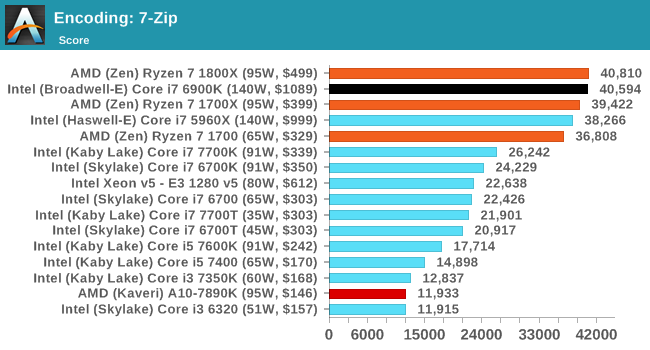
WinRAR 5.40
For the 2017 test suite, we move to the latest version of WinRAR in our compression test. WinRAR in some quarters is more user friendly that 7-Zip, hence its inclusion. Rather than use a benchmark mode as we did with 7-Zip, here we take a set of files representative of a generic stack (33 video files in 1.37 GB, 2834 smaller website files in 370 folders in 150 MB) of compressible and incompressible formats. The results shown are the time taken to encode the file. Due to DRAM caching, we run the test 10 times and take the average of the last five runs when the benchmark is in a steady state.
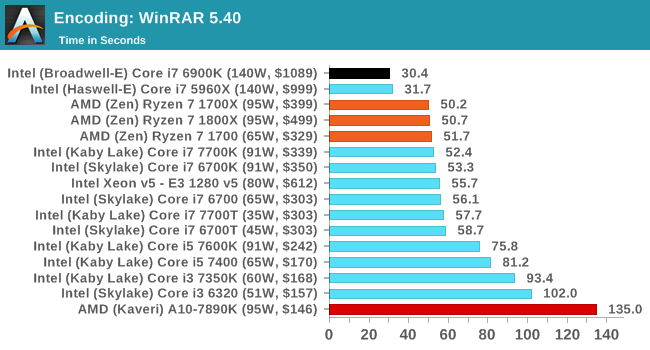
AES Encoding
Algorithms using AES coding have spread far and wide as a ubiquitous tool for encryption. Again, this is another CPU limited test, and modern CPUs have special AES pathways to accelerate their performance. We often see scaling in both frequency and cores with this benchmark. We use the latest version of TrueCrypt and run its benchmark mode over 1GB of in-DRAM data. Results shown are the GB/s average of encryption and decryption.
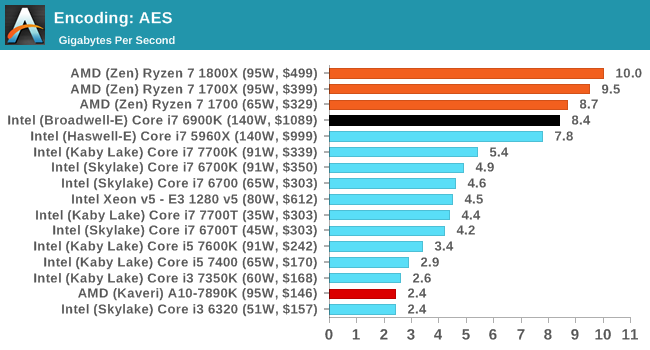
HandBrake H264 and HEVC
As mentioned above, video transcoding (both encode and decode) is a hot topic in performance metrics as more and more content is being created. First consideration is the standard in which the video is encoded, which can be lossless or lossy, trade performance for file-size, trade quality for file-size, or all of the above can increase encoding rates to help accelerate decoding rates. Alongside Google's favorite codec, VP9, there are two others that are taking hold: H264, the older codec, is practically everywhere and is designed to be optimized for 1080p video, and HEVC (or H265) that is aimed to provide the same quality as H264 but at a lower file-size (or better quality for the same size). HEVC is important as 4K is streamed over the air, meaning less bits need to be transferred for the same quality content.
Handbrake is a favored tool for transcoding, and so our test regime takes care of three areas.
Low Quality/Resolution H264: He we transcode a 640x266 H264 rip of a 2 hour film, and change the encoding from Main profile to High profile, using the very-fast preset.
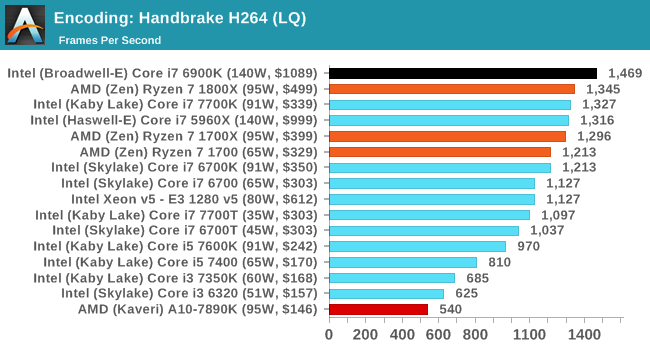
High Quality/Resolution H264: A similar test, but this time we take a ten-minute double 4K (3840x4320) file running at 60 Hz and transcode from Main to High, using the very-fast preset.
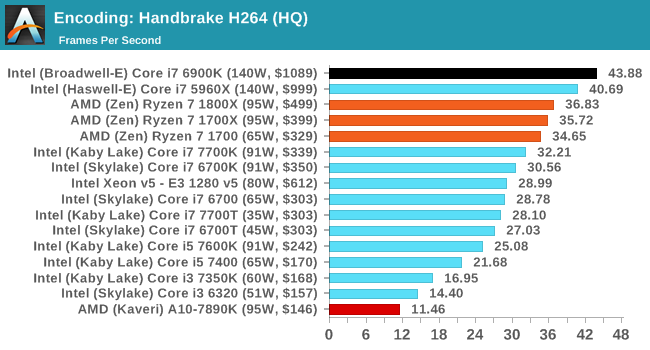
HEVC Test: Using the same video in HQ, we change the resolution and codec of the original video from 4K60 in H264 into 1080p30 HEVC. This causes a dramatic reduction in filesize.
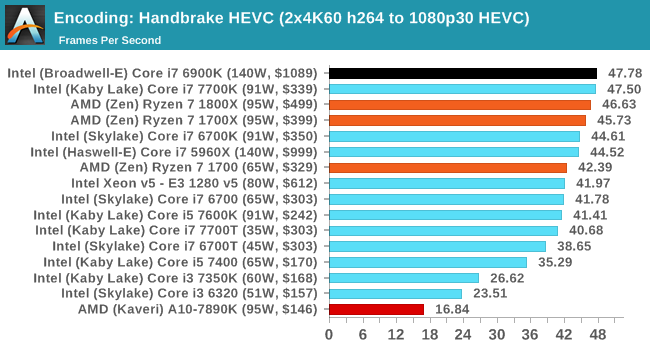










574 Comments
View All Comments
FriendlyUser - Thursday, March 2, 2017 - link
True. The 1600X will be competitive with the i5 at gaming and probably much faster in anything multithreaded. The crucial point is the price... $200 would be great.MrSpadge - Thursday, March 2, 2017 - link
"Ryzen will need to drop in price. $500 1800x is still too expensive. According to this even a 7700k @ $300 -$350 is still a good choice for gamers."That's what the 1700X is for.
lilmoe - Thursday, March 2, 2017 - link
+1And for that, I'd say the 1700 (non-x) is the best consumer CPU available ATM. BUT, if someone just wants to game, I'd say get the Core i5... For me though, screw Intel. Never going them again.
fanofanand - Thursday, March 2, 2017 - link
The 1700 is the sweet spot for anyone not trying to eek out a few more fps or drop their encode/decode times by a couple of seconds. To save $170 and lose a couple hundred mhz, I know which chip seems like the best all-around for price/performance and that's the 1700.lilmoe - Thursday, March 2, 2017 - link
Yep. You get both efficiency and performance when needed. This should allow for super quiet and very performant builds. Just take a look at the idle system power draw of these chips. Super nice.Everything is going either multi-threaded or GPU accelerated, even compiling code. What I'm really waiting for is Raven Ridge. I've got lots of stock $$ and high hopes for a low power 4-6 core Zen APU, with HBM and some bonus blocks for video encode (akin to Quicksync). I have a feeling they'll be much better for idling power and have better support for Microsoft's connected standby.
khanikun - Friday, March 3, 2017 - link
i5 is a good gamer and all around cpu for majority of users. If all you plan to do is game and a tight budget, the i3 7350k is a great cpu for just that. Once the workload goes a bit more multithreaded, that's where you'll want to move to an i5.Valis - Friday, March 3, 2017 - link
I game now and then, but I do a lot of other things too. Video rendering, Crypto coins, Folding @ home, VM, etc. So any Zen, perhaps even 4 Core later thins year with a good GPU will suit me fine. :)nos024 - Thursday, March 2, 2017 - link
So the 1800x is pointless?lilmoe - Thursday, March 2, 2017 - link
I don't think pointless is the right word. I'd say it's the worse value for dollar of the three.tacitust - Thursday, March 2, 2017 - link
Not at all pointless if you do a lot of video transcoding or other CPU intensive tasks well suited to multiple cores. The price premium is still for the 1800x is way lower than the price premium for the Intel processors.